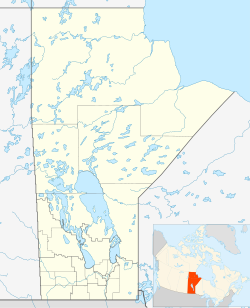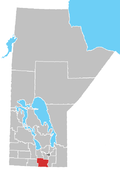This article needs additional citations for verification .(May 2020) |
Roseisle | |
|---|---|
Location of Roseisle in Manitoba | |
| Coordinates: 49°30′0″N98°20′39″W / 49.50000°N 98.34417°W | |
| Country | |
| Province | |
| Region | Pembina Valley |
| Census Division | No. 3 |
| Government | |
| • Governing Body | Rural Municipality of Dufferin Council |
| • MP | Branden Leslie |
| • MLA | Lauren Stone |
| Time zone | UTC−6 (CST) |
| • Summer (DST) | UTC−5 (CDT) |
| Postal Code | R0G 1V0 |
| Area codes | 204, 431 |
| NTS Map | 062G08 |
| GNBC Code | GAXMO |
Roseisle is an unincorporated community in south central Manitoba, Canada. It is located approximately 96 kilometres (60 miles) southwest of Winnipeg [1] in the Rural Municipality of Dufferin.

